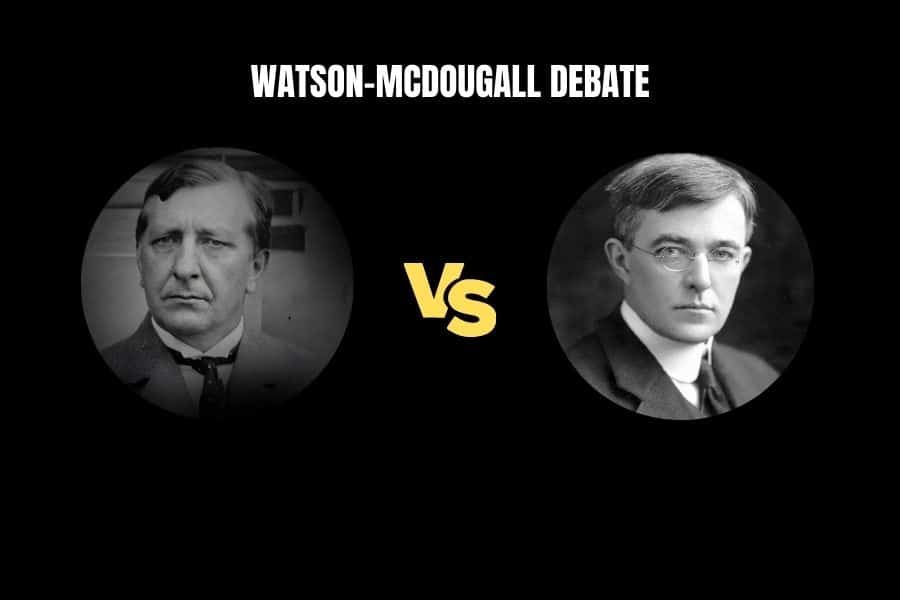Take an exciting trip to the life and work of William McDougall, a famous American psychologist whose theories have continued to impact modern psychology. By examining his childhood to the breakthroughs he made, this article shows us why McDougall’s legacy is truly remarkable.
Get to know McDougall’s childhood, education, and cultural background, providing a solid introduction to his ideas about instinct, motivation, and social psychology. Understand his accomplishments and publications, including his contribution to the whole psychological movement of today.
Take a look at McDougall’s quotes and books exploring his impact on modern psychology as well as various other debates within the field. Let us walk you through the incredible story of William McDougall, giving the reader a chance to get involved with his revolutionary ideas and enduring legacy.
Table of Contents
Biography of William McDougall
William McDougall, an American Psychologist
McDougall, a psychologist from the United States born in 1871 in Lancashire, England, was very much influenced by his Scottish cultural legacy. These experiences nurtured in him a passion for philosophy and the natural sciences from an early age, laying the groundwork for the greatness of his contribution to psychology.
Early Life and Education
McDougall’s learning process started at the University of Manchester where he initially did natural science and then switched to medicine. At Cambridge University, his passion for psychology developed increasingly, thus paving the way for advanced studies. McDougall’s interdisciplinary training grounded him in the natural and social sciences, constructing his comprehensive perspective to explain human behaviour.
Career Journey as a Psychologist
After his studies, McDougall started a brilliant career as a psychologist and held esteemed positions at University College London and Harvard University.
During his career as a researcher, instructor, and author, McDougall made meaningful contributions to the field of psychology. His theoretical work was varied, ranging from instinct to motivation and social behavior, thus securing him as one of the most eminent psychologists of the early 20th century.
Notable Achievements and Awards
McDougall’s pioneering work brought him great fame and respect in the scientific community throughout his career. He served as a fellow of the Royal Society and held the presidencies of esteemed institutions like the British Psychological Society and the American Psychological Association. His scientific accomplishments and his leadership positions substantially enhanced his image as an explorer.
What Is William McDougall Famous For?
McDougall is well-known for his ‘instinct’ theory, which suggests that inherited propensity, or instinct, rules human behaviour. According to him, individuals’ actions and motivations are guided by instincts which can vary from basic survival instincts to complicated social behaviors.
What Is William McDougall’s Cultural Heritage?
McDougall’s cultural heritage, anchored in his Scottish heritage and his upbringing in Lancashire, England, deeply shaped his intellectual development. The backdrop of his culture offered him a colorful array of perspectives, experiences, and ideas from which spring his influential contributions to psychology and his vision of what it means to be human.
William Mcdougall’s Theory of Instinct
McDougall suggested that instincts are innate, universally present in all human beings, and are hereditary. He asserted that instincts act as the main criterion for the behavior of an individual, even his emotional reaction to certain stimuli.
The Nature of Instincts
He put forward the proposition that instincts were genetic dispositions that guided an individual’s intentions toward certain goals, most notably survival, reproduction, and social behaviour. Unlike learned behaviors, instincts are biologically compelled and stay in an individual’s life.
Classification of Instincts
McDougall grouped instincts into several kinds, each fulfilling a specific evolutionary purpose:
Self-Preservation Instincts

These instincts enable survival and well-being.
- Flight: Fleeing from perceived threats.
- Fight: Face obstacles when escape is not an option.
- Repulsion: Avoiding hazardous stimuli.
Reproductive Instincts

These instincts are focused on propagating the species.
- Sexual Attraction: Seeking a partner and engaging in sexual conduct.
- Parental Care: Nurturing and protecting offspring.
Gregarious Instincts

These instincts Involve social behavior and group ties.
- Herd Instinct: It drives individuals to seek safety and camaraderie in groupings.
- Social Conformity: Adhering to social norms to promote group cohesion.
Aggressive Instincts

These instincts are Related to aggressiveness and dominance.
- Dominance: It involves asserting control and supremacy.
- Aggression: Using confrontational actions to defend oneself.
Role of Instincts in Behavior
In McDougall’s opinion, instincts govern human activity by influencing emotions, motives, and social behaviour. They make people do the things that they are biologically programmed to fulfill their needs.
Instincts Versus Learned Behaviors
McDougall made a difference between instincts and learned behaviors, emphasizing the innate characteristic of instincts as opposed to the acquired aspect of learned behaviors. With instincts as a basis of behavior, learned behaviors are a consequence of experience and environmental factors.
William Mcdougall’s Theory of Motivation
McDougall elaborated a complete system of the motivation theory based on the sources of human action. His motivation theory, which was constructed based on biological and instinctive elements, offers much-needed explanations of the intricate interactions of internal and external determinants that guide motivation.
Instinctual Motivation
McDougall’s motivation theory boils down to the idea that people have the innate propensity to exhibit instinctive desires that motivate them to perform particular behaviors. Inherited from our evolutionary past, these reflexes strive to ensure the survival and reproduction of the species. According to McDougall, the primary instincts, which include hunger, thirst, and sex, greatly shape human behaviour.

Goal-Directed Behavior
Above all, he picked out not only such instinctive but also purposive impulse conduct as motivation. According to him, people try to accomplish things that contribute to the fulfillment of their instinctual needs, for instance, acquiring food when they are hungry or developing social relations at a later point. The goal-directed action may acquire both intrinsic desire and external cues.
Emotional Motivation
McDougall gave more notice regarding the role of emotions in motivation and exalted how states of fear, anger, and joy can produce action. While emotions act as extremely important motive forces, they are responsible for shifting emotional states during the decision-making process and behavior guidance.
Individual Differences
Secondly, he highlighted that different people could respond differently to such issues as genetics, upbringing, and personal experiences. Individuals may present universal instincts differently from each other. McDougall’s theory considers the variety of human motivation, along with the multilayered connection of biological, psychological, and social factors.
Legacy and Influence
McDougall’s theory of motivation was the embryo of State-present for psychology researchers, impacting scientists like Abraham Maslow and Clark Hull. Some of his conceptions were criticized but the results of his work remained highly influential in the field of psychology.
William Mcdougall’s Social Psychology
What Is The contribution of William McDougall in Social Psychology?
McDougall did significant work in social psychology, creating concepts that are still the foundation of the discipline.
Understanding Group Behavior

After all, McDougall’s work touched on such a wide spectrum of group dynamics issues, focusing mainly on instinctual factors as they influence social behavior. He expressed the notion that hereditary factors such as inborn traits, sensitivities, and drives shape human behavior, including social interactions.
McDougall’s realizations laid the foundation for understanding the way people conduct themselves in groups as well as the actions of the groups on the individuals.
Instinct Theory in Social Psychology
McDougall’s instinct theory also went beyond the individual level’s behavioral features to explain social patterns. He further assumed that traits, such as aggressive drive or social dependence, represented the basis for social interactions. Through McDougall’s framework, the basics of human social conduct were seen as being based on its evolutionary origin.
Critique of Behaviorism
McDougall’s contribution to social psychology was the critique of behaviorism, which was the leading psychological paradigm of that time. He disputed behaviorist theories by highlighting the tremendous role of inner mental processes, emotions, and instincts in analyzing social behavior. McDougall’s criticism opened the door for a deeper understanding of the social psychology of intellectual and emotional aspects.
Influence on Subsequent Theories
McDougall laid the foundations for social psychology that others built upon, thus influencing the growth of the field. His preference for instincts and emotions as motives for social conduct prepared the grounds for the development of evolutionary psychology and socio-biology theories on human sociality. Furthermore, his works against behaviorism also brought about a variety of theories in social psychology.
William Mcdougall’s Contributions to Psychology
What Did William McDougall Propose in 1908?
In 1908, McDougall posited his theory of instinct, which was a step-change in the field of psychology. This theory argues that human behavior is a result of inborn, inherited tendencies or instincts, which interplay with environmental stimuli.
Extrasensory Perception
McDougall made an important contribution to the extrasensory perception (ESP) study area. McDougall was keen on parapsychology, which is the study of paranormal subjects such as extra-sensory perception (ESP).
He designed various experiments and popularized the topic, trying to unveil and prove the reality of psychic phenomena like telepathy and precognition. McDougall’s interest in ESP was part of his studies on human consciousness and the mind, and he wanted to apply scientific methods for the study of the phenomena.
Definition
ESP (Extrasensory perception) describes the alleged ability to perceive through pathways beyond the five physical sense organs (namely, sight, hearing, touch, taste, and smell).
Types of Extrasensory perception
Types of Extrasensory perception include:
| Telepathy | Communication of thoughts of one person directly to another person without the necessity of known sensory channels. |
| Clairvoyance | The ability to apprehend information about objects, people, or events that are beyond the range of the sensory organs. |
| Precognition | Predicting events or experiences even before they occur can be attributed to this ability. |
| Psychokinesis | The proposed notion that a person can manipulate worldly things like objects and incidents simply through their mental force. |
McDougall’s Influence and Legacy in The Field of Psychology
McDougall’s contribution still shapes and influences psychology. His brainchild on instinct, motivation, and social psychology has affected generations of psychologists’ work. Through his biology-focused approach to behavior, McDougall’s ideas have continued to influence research in evolutionary psychology and neuropsychology, spotlighting their enduring validity.
McDougall’s Noteworthy Publications and Papers
During his career, McDougall produced a wealth of influential publications. It is not an exaggeration to say that the work of “An Introduction to Social Psychology” to his pioneering papers on instinct and motivation set pathways of psychology. Throughout the years, his very detailed research and theoretical facts are still being studied and referred to by scholars worldwide.
The Watson-McDougall Debate

Overview of the Debate
An intellectual impact of the Watson-McDougall Debate is that it holds key positions about the nature of behavior and the role of instincts. The core of the debate was whether the learned associations can be considered exclusively as behavioral causes or if biological factors, including instincts, can be credited with a great deal of it.
Positions Held by McDougall
McDougall thus was a supporter of instinct theory and he praised instinct theory too much. McDougall believed that these instincts were inherited and universal across human populations, thus functioning as powerful determinants of human behavior. He reaffirmed the biological roots of behavior and the importance of evolutionary mechanisms in explaining psychological experiences.
Impact of the Debate on Psychological Thought
The Watson-McDougall Debate was a major catalyst for psychological phenomena that manifested itself through the development of behaviorism as the dominant paradigm in the field.
While Watson’s behaviorism became prominent, McDougall’s defense of instinct theory began further discussions on the relationship between human biology and behavior. The debate also sparked additional study and scrutiny into the intricacies of human behavior and cognition; the latter of which was adopted by later psychologists.
William Mcdougall’s Quotes

Below are some noteworthy quotes ascribed to Mcdougall:
“The greatest discovery of my generation is that human beings can alter their lives by altering their attitudes of mind.”
“The impulse to seek novelty and variety, the tendency to react to new stimuli with curiosity, interest, and exploration, are inborn tendencies of our species.”
“Every science must begin by supplying certain postulates as a basis of its deductions, and Psychology is no exception to this rule.”
“The instincts that impel the individual to gain the favor of his fellows and to help them, to submit to and to maintain the customs and rules of his social group, are also of primary importance in the life of man.”
William Mcdougall’s Books
Below are some noteworthy books and publications ascribed to Mcdougall:
“An Introduction to Social Psychology” (1908): This outstanding book by McDougall examines the social behaviors affecting factors like social instincts, group psychology, and culture. This book becomes a seminal work in the social psychology field.
“Body and Mind: A History and Defense of Animism” (1911): In this book, he explores the idea of animism that says everything beings that is alive have a spiritual soul within them. He goes back to the historical sources of animistic beliefs to show that this paradigm applies to psychology as well.
“The Group Mind: A Sketch of the Principles of Collective Psychology with Some Attempt to Apply Them to the Interpretation of National Life and Character” (1920): McDougall turns the spotlight on the mental life of collective entities like countries, tribes, and organizations, and how a shared set of beliefs, norms, and values influences group behavior and identity.
“The Energies of Men: A Study of the Fundamentals of Dynamic Psychology” (1932): He discusses the idea of psychological energy that can be expressed in terms of the instinctual drives that create emotional intensity and affect behavior and personality development.
Conclusion
While analyzing the life and works of William McDougall, we discovered the complex journey of a well-known American psychologist. From his early life and education to his outstanding achievements and cultural heritage, it seems that every one of those facets gives us a vivid image of McDougall’s background.
We explored McDougall’s revolutionary instinct, motivation, and social psychology theories, which arguably present his most significant contributions to the field. We further discussed his ideas in 1908, his significant works, and the long-term influence of his theories on psychology today. Furthermore, we analyzed McDougall’s role in the Watson-McDougall Debate, key arguments, and consequences for psychology. Through insightful quotes and a review of the significant books of McDougall, the readers obtained a deeper grasp of his enduring heritage in psychology.
FAQS
Who was William McDougall?
McDougall was a prominent psychologist and philosopher whose contributions to psychology were noticeable, especially in the area of instinct theory and social psychology. He advanced our understanding of how people think and act.
What are some key theories developed by William McDougall?
McDougall’s name is mainly associated with the concept of instinct, which implies that human behavior works in response to inherited instincts. Besides the theory of social psychology on what led to social factors as factors that influence the behaviors and emotions of individuals.
What is McDougall’s theory of instincts?
McDougall conjectures that humans are endowed with natural or inherited qualities which direct human behavior. These impulses have been considered as a common root for humanity and human needs and behaviors.
How did William McDougall contribute to psychology?
Among the legacies of McDougall are his groundbreaking instinct theory, social psychology, and experimental psychology. He also became one of the founders of providing psychology with a scientific approach and encouraged the evolutionary view of behavior.
What is McDougall’s legacy in the field of psychology?
McDougall can be credited with several theories, studies and publications that are still of value in helping to grasp human behavior today. He set the stage for the eventual emergence of disciplines like evolutionary psychology and the study of emotions.













